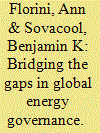|
|
|
Sort Order |
|
|
|
Items / Page
|
|
|
|
|
|
|
| Srl | Item |
| 1 |
ID:
102347


|
|
|
|
|
| Publication |
2011.
|
| Summary/Abstract |
Energy constitutes a rich, but underexplored, arena for global governance
scholars and policymakers. The world is currently on an unsustainable and
conflict-prone track of volatile and unreliable supply of energy fuels, vulnerable
infrastructure, massive environmental degradation, and failure to
deliver energy services to an enormous proportion of the global population.
Changing to a different path will be a monumental global governance
endeavor that will require bridging multiple issue areas, regimes,
and policy silos. Meeting that challenge will require a greatly expanded research
agenda aimed at understanding the institutions, interests, and concerns
that do and could shape global energy governance. In this article, we
lay out key energy-related global issues and explore some of the connections
among them to suggest an initial research agenda for global governance
scholars.
|
|
|
|
|
|
|
|
|
|
|
|
|
|
|
|
| 2 |
ID:
081022


|
|
|
|
|
| Publication |
New York, Columbia University Press, 2007.
|
| Description |
viii, 368p.
|
| Series |
Initiative for policy dialogue at columbia
|
| Standard Number |
9780231141581
|
|
|
|
|
|
|
|
|
|
|
|
Copies: C:1/I:0,R:0,Q:0
Circulation
| Accession# | Call# | Current Location | Status | Policy | Location |
| 053172 | 352.88/FLO 053172 | Main | On Shelf | General | |
|
|
|
|
| 3 |
ID:
103250


|
|
|
|
|
| Publication |
2011.
|
| Summary/Abstract |
International Relations (IR) scholarship is directly in the path of two simultaneous tidal waves. The first is the rise of China and India in the traditional IR terms of military and economic power. The second is the expanding nature of what IR scholarship needs to address, as global integration transforms the nature of the issues to be addressed and numerous trends expand the number and types of relevant actors. Neither theory nor practice is yet coping well with the profound implications of these fundamental changes. Investigating what kind of a world order might emerge from these two simultaneous tsunamis will require an enormous research agenda that explores the roles of ideas, structural factors, and path dependencies across regions and issue areas. This article aims to illuminate a subset focused around the connection between theory and practice as related to two emerging powers. It briefly maps developments in Western IR theory and explores how those connect-or fail to connect-with intellectual and policy currents in the rising Asian giants. It draws on a number of interviews and workshops held in Asia in the past two years that explore how Asian scholars and policymakers are dealing with, and perhaps beginning to shape, the rapidly changing conceptual landscape.
|
|
|
|
|
|
|
|
|
|
|
|
|
|
|
|
| 4 |
ID:
092747


|
|
|
|
|
| Publication |
2009.
|
| Summary/Abstract |
This article conceptualizes the energy problems facing society from a global governance perspective. It argues that a notion of "global energy governance," taken to mean international collective action efforts undertaken to manage and distribute energy resources and provide energy services, offers a meaningful and useful framework for assessing energy-related challenges. The article begins by exploring the concepts of governance, global governance, and global energy governance. It then examines some of the existing institutions in place to establish and carry out rules and norms governing global energy problems and describes the range of institutional design options available to policymakers. It briefly traces the role of a selection of these institutions, from inter-governmental organizations to summit processes to multilateral development banks to global action networks, in responding to energy issues, and points out their strengths and weaknesses. The article concludes by analyzing how the various approaches to global governance differ in their applicability to addressing the conundrums of global energy problems.
|
|
|
|
|
|
|
|
|
|
|
|
|
|
|
|
|
|
|
|
|